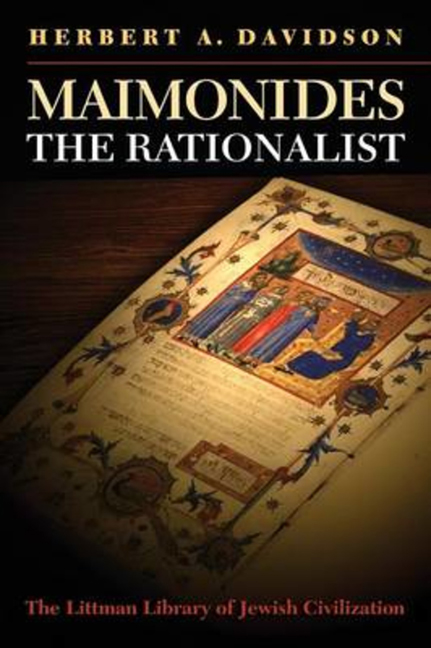Book contents
- Frontmatter
- Dedication
- Preface and Acknowledgements
- Contents
- Publisher's Note on Transliteration
- Abbreviations and Note on Sources
- 1 The Study of Philosophy as a Religious Obligation
- 2 The First Two Positive Divine Commandments
- 3 Maimonides' Knowledge of the Philosophical Literature in his Rabbinic Period
- 4 Maimonides' Shemonah perakim and Alfarabi's Fuṣūl Muntaza'a
- 5 Maimonides' Knowledge of the Philosophical Literature in his Later Period
- 6 Maimonides on Metaphysical Knowledge
- 7 A Problematic Sentence in Moreh nevukhim, ii. 24
- 8 Maimonides' Ethical Systems
- 9 Maimonides the Rationalist
- Works Cited
- Index
Preface and Acknowledgements
- Frontmatter
- Dedication
- Preface and Acknowledgements
- Contents
- Publisher's Note on Transliteration
- Abbreviations and Note on Sources
- 1 The Study of Philosophy as a Religious Obligation
- 2 The First Two Positive Divine Commandments
- 3 Maimonides' Knowledge of the Philosophical Literature in his Rabbinic Period
- 4 Maimonides' Shemonah perakim and Alfarabi's Fuṣūl Muntaza'a
- 5 Maimonides' Knowledge of the Philosophical Literature in his Later Period
- 6 Maimonides on Metaphysical Knowledge
- 7 A Problematic Sentence in Moreh nevukhim, ii. 24
- 8 Maimonides' Ethical Systems
- 9 Maimonides the Rationalist
- Works Cited
- Index
Summary
MAIMONIDES was not the first rabbinic scholar to take an interest in philosophy. He was preceded by a small contingent of rabbinic scholars in Iraq who dabbled in the subject, the best known being Sa'adiah Gaon. But except for Sa'adiah's Beliefs and Opinions, their writings, the rabbinic as well as the philosophical— and it is only with indulgence that any of the latter may be granted the label philosophical—have been relegated to the rare book shelves of research libraries.Maimonides, by contrast, not merely interested himself in rabbinics as well as philosophy; he was a towering figure in each. His law code, the Mishneh torah, stands with Rashi's commentary on the Babylonian Talmud as one of the two most influential and intensely studied rabbinic works coming out of the Middle Ages, and his Guide for the Perplexed is the most influential and widely read Jewish philosophical work ever written. His accomplishments in both areas are, still today, the object of endless attention.
He moreover expressed unreserved commitment to both a rabbinic and a philosophical world-view. Yet each is hegemonic, and they are commonly thought to be mutually exclusive. Admirers as well as critics have consequently arrived at wildly divergent perceptions of the man. At one extreme, we are given a Maimonides who understood God to be wholly impersonal—if He exists at all—and who accordingly denied the possibility of communication between God and man, individual providence, and personal immortality; a man who lavished decades and boundless energy on his rabbinic writings, repeatedly going back to correct them, with no other aim than to create a smokescreen for concealing, and a vehicle for advancing, a radical philosophical ideology. At the other, we find a pious religious teacher who performed the invaluable service of identifying the principles of the Jewish faith and the 613 commandments that God communicated to Moses at Sinai, who instructed his co-religionists on the proper way to observe the commandments of the Written Torah and halakhot of the Oral Torah, and who was himself meticulous in observing the precepts of both. Observers of the latter persuasion often symbolize their picture of Maimonides by using his Hebrew name even when writing or speaking in a western language. They do not call him ‘Maimonides’, a European coinage, but, instead, ‘Rambam’, the Hebrew acronym for Rabbenu Mosheh ben Maimon.
- Type
- Chapter
- Information
- Maimonides the Rationalist , pp. vii - xPublisher: Liverpool University PressPrint publication year: 2011

